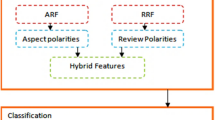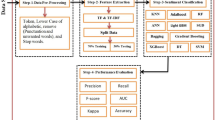Abstract
To enhance customer and product services, customer reviews play a must-have role for any business organization in the digital era. Business organizations can improve customer and product services to their greatest level by further analyzing the customer’s demands. For this purpose, text mining helps to convert unstructured text into structured form for further analysis. Sentiment analysis is a concept of opinion mining which draws significant advantages by classifying the customer reviews as positive or negative. The principal goal of this paper is to perform opinion classification. Bag of Words (BOW) and Term Frequency-Inverse Document Frequency (TF-IDF) are used as feature extraction techniques along with N-Gram and Random Forest (RF), Support Vector Machine (SVM), and Naive Bayes (NB) and are regarded as machine learning classifiers for reviews classification. Again, voting ensemble classifier has also been applied in order to investigate better performance and customer reviews are considered to accomplish the job. Though all the classifiers and feature extraction techniques achieve good performance, voting ensemble performs better among the classifiers while TF-IDF performs better for feature extraction techniques. From the notable result of the experiment, it can be pointed out that the implemented technique of customer reviews analysis might be an effective use to reshape business products.
Access this chapter
Tax calculation will be finalised at checkout
Purchases are for personal use only
Similar content being viewed by others
References
Hu M, Liu B (2004) Mining and summarizing customer reviews. In: Proceedings of the tenth ACM SIGKDD international conference on Knowledge discovery and data mining, pp 168–177
Kaviya K, Shanthini KK, Sujithra M (2018) Micro-blogging sentimental analysis on Twitter data using Naïve Bayes machine learning algorithm in Python. Int J Math Comput Sci 4
Fouad MM, Gharib TF, Mashat AS (2018) Efficient Twitter sentiment analysis system with feature selection and classifier ensemble. International conference on advanced machine learning technologies and applications. Springer, Cham, pp 516–527
Qamar AM, Alsuhibany SA, Ahmed SS (2017) Sentiment classification of twitter data belonging to saudi arabian telecommunication companies. Int. J. Adv. Comput. Sci. Appl 1(8):395–401
Elghazaly T, Mahmoud A, Hefny HA (2016) Political sentiment analysis using Twitter data. In: Proceedings of the international conference on internet of things and cloud computing, pp 1–5
Bespalov D, Bai B, Qi Y, Shokoufandeh A (2011) Sentiment classification based on supervised latent n-gram analysis. In: Proceedings of the 20th ACM international conference on information and knowledge management, pp 375–382
Zul MI, Yulia F, Nurmalasari D (2018) Social media sentiment analysis using K-means and Naïve Bayes algorithm. In: 2018 2nd international conference on electrical engineering and informatics (ICon EEI). IEEE, pp 24–29
Venkatesh P (2019) Sentiment analysis classification. https://www.kaggle.com/prasy46/sentiment-analysis-classification. Accessed 30 May 2020
Chowdhury SMH, Ghosh P, Abujar S, Afrin MA, Hossain SA (2019) Sentiment analysis of tweet data: the study of sentimental state of human from tweet text. Emerging technologies in data mining and information security. Springer, Singapore, pp 3–14
Ahuja R, Chug A, Kohli S, Gupta S, Ahuja P (2019) The impact of features extraction on the sentiment analysis. Procedia Computer Sci 152:341–348
Sayeedunnissa SF, Hussain AR, Hameed MA (2013) Supervised opinion mining of social network data using a bag-of-words approach on the cloud. In: Proceedings of seventh international conference on bio-inspired computing: theories and applications (BIC-TA 2012). Springer, pp 299–309
Al Amrani Y, Lazaar M, El Kadiri KE (2018) Random forest and support vector machine based hybrid approach to sentiment analysis. Procedia Computer Sci 127:511–520
Khairnar J, Kinikar M (2013) Machine learning algorithms for opinion mining and sentiment classification. Int J Sci Res Publ 3(6):1–6
Perikos I, Hatzilygeroudis I (2016) Recognizing emotions in text using ensemble of classifiers. Eng Appl Artif Intell 51:191–201
Author information
Authors and Affiliations
Editor information
Editors and Affiliations
Rights and permissions
Copyright information
© 2021 The Author(s), under exclusive license to Springer Nature Singapore Pte Ltd.
About this paper
Cite this paper
Hasan, T., Matin, A. (2021). Extract Sentiment from Customer Reviews: A Better Approach of TF-IDF and BOW-Based Text Classification Using N-Gram Technique. In: Uddin, M.S., Bansal, J.C. (eds) Proceedings of International Joint Conference on Advances in Computational Intelligence. Algorithms for Intelligent Systems. Springer, Singapore. https://doi.org/10.1007/978-981-16-0586-4_19
Download citation
DOI: https://doi.org/10.1007/978-981-16-0586-4_19
Published:
Publisher Name: Springer, Singapore
Print ISBN: 978-981-16-0585-7
Online ISBN: 978-981-16-0586-4
eBook Packages: Intelligent Technologies and RoboticsIntelligent Technologies and Robotics (R0)




